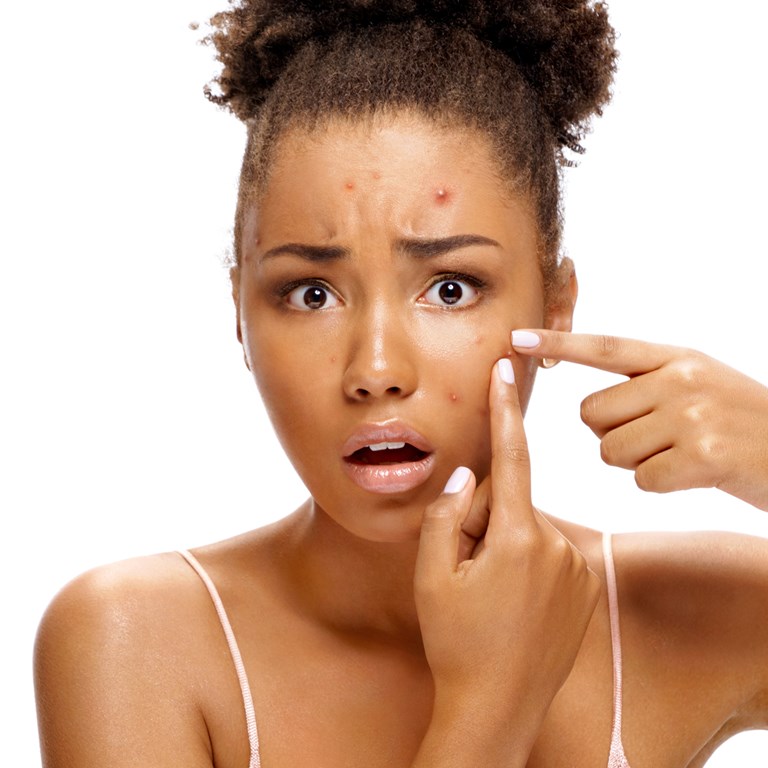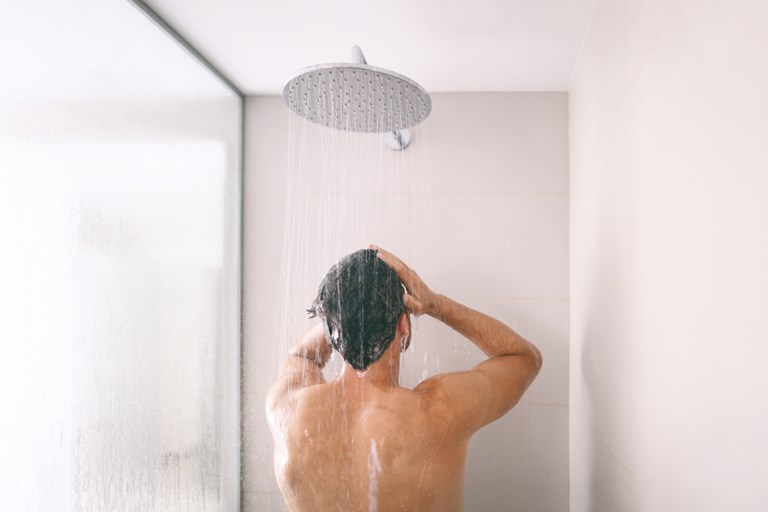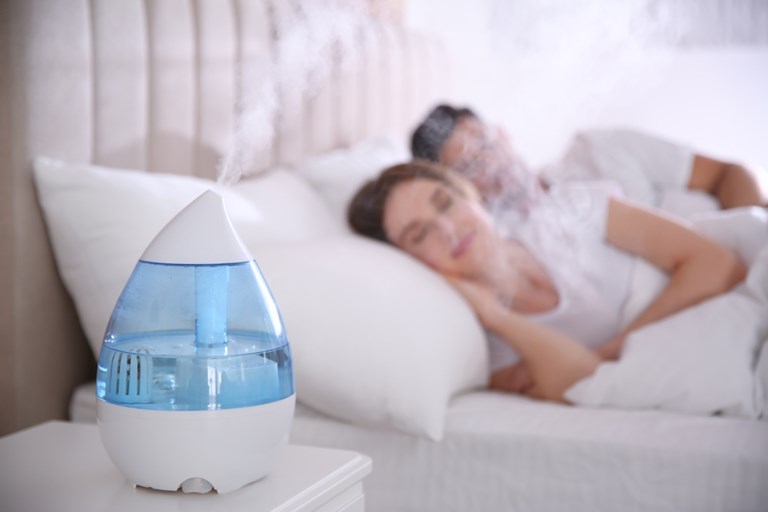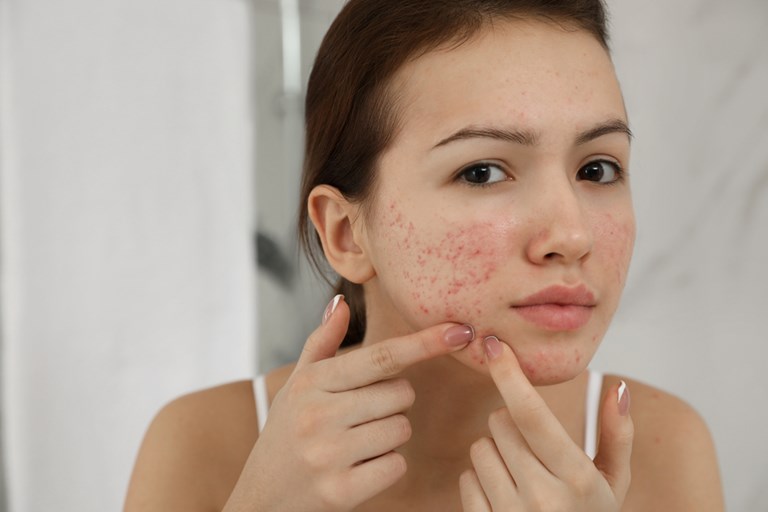Acne is a common skin condition experienced by most people at some point in their lives. It typically presents on the face, back or chest when hair follicles in the skin become blocked. In mild cases, blackheads or whiteheads can form on the skin, however, they can present as pus-filled spots or cysts which can become infected in more severe cases. These spots can leave scars on the skin, even when acne has cleared.
In the winter, acne can worsen because the skin is drier and lacks hydration. In response, it produces more sebum, an oily substance that lubricates the hair and the skin to stop it from drying out. Excess sebum plugs the hair follicles leading to the development of spots that can become infected and cause cysts.
Why is acne worse in the winter?

In the winter your skin becomes drier due to changes in the environment which reduce humidity. The cold weather outside causes a significant drop in air moisture which, combined with the dry air of indoor heating systems, reduces the moisture retained by the skin, causing it to dry out. The harsh winter temperatures and windy conditions outside dehydrate your skin further, as do common winter practices, such as taking long, hot showers.
Your dry skin produces extra sebum, to stop further moisture loss. This increases the likelihood of spot and acne development as the excess sebum can clog up your pores and hair follicles. Dry skin is also a less effective barrier to infection, due to the lack of moisture, meaning bacteria can more easily infect any spots, and trapped sebum, causing the skin to develop cysts and become irritated.
In winter, we are also exposed to less sunlight and therefore, less vitamin D. Whilst the evidence isn’t conclusive, a 2016 study showed that 48.8% of patients with acne were also vitamin D deficient, compared to only 22.5% of controls without acne. These results suggested a link between vitamin D levels and acne development and could be another reason why people notice more acne flare-ups in winter. The NHS recommends taking as a supplement (10mcg/400IU daily) to counteract any deficiency. Our sister company, Chemist Direct, stock a wide range of vitamin D supplements and tablets.
How to prevent winter acne
The good news is there are a lot of things you can do to prevent winter acne, mainly through ensuring your skin stays hydrated.
1. Don’t take long hot showers

As previously mentioned, long, hot showers dehydrate your skin. If you want to have a bath it is best to use lukewarm water as it’s less harsh on your skin. If you’re looking for a hot shower, make sure you limit them to five minutes reducing damage to your skin. If you aren’t exercising daily, you don’t need to shower for long periods every day which may dry out your skin. If you fall into this camp, it’s best to wash every other day. If you’re more active, ensure you only shower once a day, at most, to minimise skin moisture loss and irritation.
2. Moisturise regularly, particularly after showering
Ensure you use moisturiser straight after showering or bathing, as an application to damp skin is more effective than it is to dry. This is because there is more moisture on the skin surface to trap and rehydrate it. Concentrate on acne-prone areas, including your face, back or chest, and use products that are “non-comedogenic” and therefore won’t block your pores. Applying a few layers of moisturiser is often more effective than buying thicker creams. You should also make sure you’re using a cream, as opposed to a lotion, as the latter can include alcohol and fragrance which can irritate the skin. When selecting a cream, look for those that include hyaluronic acid and ceramide as opposed to botanicals like lavender tea tree oil or coconut oil. Good options include the CeraVe Moisturising Cream and the CeraVe Hyaluronic Acid Serum. You can also try intensive sheet masks like the Eucerin Hyaluronic Acid Sheet Mask.
3. Avoid make-up and skincare products that are oil-based or fragrant

Oily skincare and make-up products are more likely to clog up your pores. As mentioned, use water-based non-comedogenic products, as they’re less likely to do this. It’s also important to opt for less fragrant skincare products. The stronger a moisturiser smells, the more likely it is to irritate your skin and cause it to become dry, itchy and cracked. It is best to use fragrance-free products where possible.
4. Cleanse your skin regularly and don’t over-exfoliate
It is important to keep your skin clean by washing it, but not excessively. Minimise your use of soaps, particularly perfumed ones, as these can dry out the oils in your skin. Try to use soaps with moisturising preparations or opt for cleansers that are soap-free. Whilst exfoliating is important, you should only do this once or twice per week as this practice also strips moisture and oils from your skin and can make it drier and itchier. Cleansing with products containing hyaluronic acid, such as CeraVe nighttime care and cleanse and Eucerin DermatoCLEAN + Hyaluron Cleansing Facial Toner is also good for your skin.
5. Use a humidifier indoors

To combat the dry environmental conditions experienced in winter, consider buying a humidifier and using it in the room where you sleep. Setting the machine to 50-60% humidity should be sufficient to rehydrate the top layer of your epidermis and reduce the effects of spending lots of time in dry environments.
Patient info and Acne Support both offer further information about how to prevent acne development.
How to treat winter acne
As well as preventing your winter acne by rehydrating your skin using the skincare products listed above, there are also acne treatments that you can take orally or apply to your skin.

Treating mild winter acne
If your acne is mild a pharmacist should be able to recommend to you how to treat it with over-the-counter gels or creams that contain benzoyl peroxide. Common branded products include Quinoderm and Acnecide. These work by removing the blockage from the skin pores, as well as providing an anti-bacterial action. If you are using it for the first time, it’s best to start with a lower strength (4-5%) and try it on a small area of skin first, as some people find that it can irritate the skin. Higher strengths (up to 10%) are also available. Chemist Direct also offer acne creams to buy online that don’t require a prescription.
Treating severe winter acne
If your winter acne is more severe, it is worth going to see your doctor who can write you a prescription. Some treatments include azelaic acid, such as Skinoren cream, and function in a similar way to benzoyl peroxide. Retinoids are another common form of prescription medication for acne. They can cause some redness and skin peeling at first, but this usually resolves with time. Products include Differin cream or gel.
Another prescription-only product is Epiduo Gel which includes benzoyl peroxide and adapalene. Adapalene acts similarly to retinoids and specifically targets the processes of the skin that cause acne by reducing the formation of blocked pores, as well as acting as an anti-inflammatory.
Oral antibiotics, and those that are applied to the skin, are also sometimes necessary. Dalacin-T solution, Duac Once Daily gel, and Zineryt Topical solution can all be applied directly to the skin whilst Minocin MR capsules, Oxytetracycline tablets, and Tetralysal capsules can be taken orally if applying products to the skin causes too much irritation.
You can find more information on acne treatment on the NHS and British Association of Dermatologists website.


